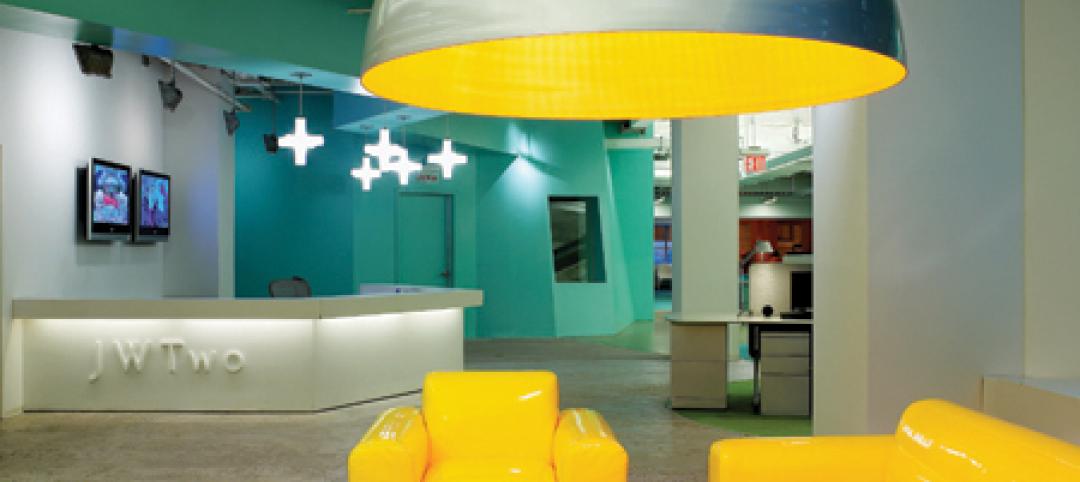Houston continues to be a paradise for AEC firms. The Texas metroplex has more than 14.4 million sf of office construction in the works, making it the No. 1 market in North America for office building, according to Colliers International’s 2015 North America Office Market report.
This report assesses 92 markets in the U.S. and Canada, and analyzes factors and trends that might impact the office construction market’s health. Despite a slow first quarter, Colliers is forecasting growth for this year.
The top 10 markets in North America, in descending order, are Houston, Seattle/Puget Sound, San Jose, Washington D.C., Dallas, Toronto, Calgary, San Francisco, Boston, and Phoenix. Combined, they accounted for 58% of the 113.8 million sf of office space underway in the U.S. and Canada in the first quarter of this year. That percentage is more than double these markets’ 27% share of existing office inventory.
As of the first quarter, office construction in the United States stood at 95.2 million sf, or 1% off from the same period a year earlier. However, deliveries in the first quarter, at 16 million sf, were the highest they’d been since the third quarter of 2009. Colliers says demand for new space “remains voracious” high-tech oriented markets. On the other hand, the greatest oversupply risk is in energy driven markets.
Colliers still sees the U.S. office market as positioned for expansion this year. “Growth in nearly every subsector of the primary office-using employment sectors in Q1 2015 despite numerous headwinds bodes well for office demand going forward,” it predicts. And outside of a handful of markets, oversupply is not a concern.
Among the 10 largest office construction markets:
• Seattle has 8.29 million sf under construction, the vast majority of which is being built in its downtown area, where existing inventory exceeds 56 million sf.
• In San Jose, all of its 8.1 million sf of new office construction is occurring in the suburbs, which already have 68.4 million sf of existing office space available, but where San Jose’s vacancy rate is only 8%.
• Washington D.C. has an 11.7% urban vacancy rate and a 17.5% suburban vacancy rate. Nevertheless, Washington has nearly 4.4.million sf of office space under construction in its suburbs, and another 2.4 million sf being built in its downtown.
• Only 450,000 sf of the 5.8 million sf of offices under construction in Dallas will be downtown. The same dynamic is occurring in Houston, where only 1.4 million sf of its total office construction is downtown.
Related Stories
| Aug 11, 2010
U.S. firm designing massive Taiwan project
MulvannyG2 Architecture is designing one of Taipei, Taiwan's largest urban redevelopment projects. The Bellevue, Wash., firm is working with developer The Global Team Group to create Aquapearl, a mixed-use complex that's part of the Taipei government's "Good Looking Taipei 2010" initiative to spur redevelopment of the city's Songjian District.
| Aug 11, 2010
High-Performance Workplaces
Building Teams around the world are finding that the workplace is changing radically, leading owners and tenants to reinvent corporate office buildings to compete more effectively on a global scale. The good news is that this means more renovation and reconstruction work at a time when new construction has stalled to a dribble.
| Aug 11, 2010
Idea Center at Playhouse Square: A better idea
Through a unique partnership between a public media organization and a performing arts/education entity, a historic building in the heart of downtown Cleveland has been renovated as a model of sustainability and architectural innovation. Playhouse Square, which had been working for more than 30 years to revitalize the city's arts district, teamed up with ideastream, a newly formed media group t...
| Aug 11, 2010
200 East Brady
Until July 2004, 200 East Brady, a 40,000-sf, 1920s-era warehouse, had been an abandoned eyesore in Tulsa, Okla.'s Brady district. The building, which was once home to a grocery supplier, then a steel casting company, and finally a casket storage facility, was purchased by Tom Wallace, president and founder of Wallace Engineering, to be his firm's new headquarters.
| Aug 11, 2010
Two Rivers Marketing: Industrial connection
It was supposed to be the perfect new office. In July 2003, Two Rivers Marketing Group of Des Moines, Iowa, began working with Shiffler Associates Architects on a 14,000-sf building to house their rapidly growing marketing firm. Over the next six months they put together an innovative program that drew on unprecedented amounts of employee feedback.
| Aug 11, 2010
AIA Course: Enclosure strategies for better buildings
Sustainability and energy efficiency depend not only on the overall design but also on the building's enclosure system. Whether it's via better air-infiltration control, thermal insulation, and moisture control, or more advanced strategies such as active façades with automated shading and venting or novel enclosure types such as double walls, Building Teams are delivering more efficient, better performing, and healthier building enclosures.
| Aug 11, 2010
Glass Wall Systems Open Up Closed Spaces
Sectioning off large open spaces without making everything feel closed off was the challenge faced by two very different projects—one an upscale food market in Napa Valley, the other a corporate office in Southern California. Movable glass wall systems proved to be the solution in both projects.
| Aug 11, 2010
Silver Award: Pere Marquette Depot Bay City, Mich.
For 38 years, the Pere Marquette Depot sat boarded up, broken down, and fire damaged. The Prairie-style building, with its distinctive orange iron-brick walls, was once the elegant Bay City, Mich., train station. The facility, which opened in 1904, served the Flint and Pere Marquette Railroad Company when the area was the epicenter of lumber processing for the shipbuilding and kit homebuilding ...
| Aug 11, 2010
Special Recognition: Durrant Group Headquarters, Dubuque, Iowa
Architecture firm Durrant Group used the redesign of its $3.7 million headquarters building as a way to showcase the firm's creativity, design talent, and technical expertise as well as to create a laboratory for experimentation and education. The Dubuque, Iowa, firm's stated desire was to set a high sustainability standard for both itself and its clients by recycling a 22,890-sf downtown buil...
| Aug 11, 2010
Thrown For a Loop in China
While the Bird's Nest and Water Cube captured all the TV coverage during the Beijing Olympics in August, the Rem Koolhaas-designed CCTV Headquarters in Beijing—known as the “Drunken Towers” or “Big Shorts,” for its unusual shape—is certain to steal the show when it opens next year.








